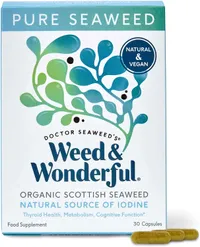Healthiest diets in the world: 6 of the countries with the healthiest diets
From Iceland to Africa, let your diet be inspired by nutritious morsels from all around the world


Give your health a boost by adopting these nutritious eating habits from some of the healthiest diets in the world.
Diets come in and out of fashion. Each time something new pops up, many rush to give it a go. But, rather than a quick fix, we should be trying to make sensible lifestyle choices - ones that we won't feel like an effort. To some extent, the healthy diet you choose will be based on taste preference. But when you’ve found the exciting new healthful foods that please your palate, don’t try to change everything all at once.
Bridget Benelam, Nutrition scientist and nutrition communications Manager from the British Nutrition Foundation says: "Pick one or two things to change that feel achievable and try to stick with these regularly. You can always build in more changes as you gain confidence." What habits will you choose to pick up from the healthiest diets in the world…
The healthiest diets in the world
1. Nordic diet
A traditional Nordic diet, eaten in Scandinavia, Iceland and Norway, is high in quality protein sources, complex carbohydrates and superfoods. People in these countries tend to get their protein from fish and seafood alongside dairy products like skyr, which is a fresh sour milk cheese consumed like yogurt.
Wholegrains are also popular, with dark rye breads and wholegrain crispbreads providing complex carbohydrates. Nutritional therapist Hannah Neville-Green at organic veg box company Riverford says: “These slower release carbohydrates have a lower glycemic index [GI] than refined grain products, so they are more supportive of blood sugar balance and can provide sustained energy.” You can find the GI of foods via The University of Sydney's online database.
Generally, people eat little processed foods. The diet consists mainly of wholefoods, including some particularly nutrient-dense plant foods such as seaweed (dulse), Icelandic moss, wild greens and berries.
Nutritional therapist Hannah continues: “The Nordic diet is wonderfully rich in omega-3 fatty acids, which are anti-inflammatory and support cardiovascular health. Secondly, skyr is an excellent source of protein. This means it's great for maintaining stable blood sugar levels. It's also a good source of calcium, which is important for supporting healthy bones and teeth.” Indeed one study of healthy, untrained men found that consuming Icelandic yogurt after resistance training helped build muscle and strength.
Parenting advice, hot topics, best buys and family finance tips delivered straight to your inbox.
Goodto verdict: Senior Health Writer Jenny Rowe says: “I run and strength train three times every week, which means I often struggle with tired, sore muscles. I tried adding Skyr to my diet and noticed that I had fewer aches and pains after workouts, which means I am able to train more efficiently.”
Brands such as Arla, Isey and Lindahls are all great options and commonly found in UK supermarkets.
Meanwhile, you may think seaweed is hard to get hold of in the UK, but Doctor Seaweed’s supplements make it easier than ever. “Iodine in seaweed is essential for thyroid health and hormonal balance,” says nutritional therapist Hannah.
Doctor Seaweed's Weed & Wonderful Pure Seaweed capsules - £12.95 | Amazon
Each vegan capsule contains 100% pure seaweed powder which has been sustainably wild-harvested, and promises longer retention in the body compared to synthetic sources used in other iodine supplements.
2. Mediterranean diet
The Mediterranean diet is originally based on eating habits popular in countries that border the Mediterranean Sea, and it’s characterised by a high intake of legumes, wholegrains, fruits, vegetables, herbs, fish and unsaturated fats such as olive oil, moderate intake of red wine and dairy, and low consumption of meat products.
And it's earnt its place on this list, outranking the DASH, MIND and Flexitarian diets to top an annual US ‘best diet list’ for the fifth time in 2023. It’s also among the most researched.
Nutritional therapist Hannah says: “Eating Mediterranean style has been shown to reduce the risk of developing metabolic syndrome conditions like type 2 diabetes, high blood pressure and high cholesterol, which are all risk factors for heart disease. It’s also associated with longevity and maintenance of a healthy weight.”
The traditional Mediterranean diet is also known for its brain-boosting benefits. Those who adhered closest to it had less hallmark signs of Alzheimer’s disease, according to a recent study in Neurology journal. Their brains were actually similar to those of people a staggering 18 years younger.
So what’s its secret? “The Mediterranean diet includes a diverse range of plant foods, good quality proteins like fish, meat and pulses and healthy fats, offering a broad spectrum of the vitamins and minerals we need to stay healthy along with phytonutrients like polyphenols, which reduce inflammation and support gut health,” explains nutritional therapist Hannah. A healthy gut has been associated with better mental health, immunity and stress management.
3. Green Mediterranean diet
Not content with the chart-topping traditional Mediterranean diet, scientists were keen to test its limits. Enter the Green Mediterranean diet, which contains more plant-based foods, no red meat and more polyphenols.
Scientists introduced the concept in a 2020 study in Heart journal. The researchers recruited almost 300 sedentary people with moderate obesity and split them into three groups. They either ate a basic healthy diet; followed the traditional Mediterranean diet; or followed the new Green Mediterranean diet. Regular exercise was encouraged in all groups. After six months, the new diet had proven itself to be superior on every front.
- Weight loss: The Green group had lost 1.2kg more weight than those following the traditional diet, and 4.7kg more than those just eating healthily. Waist circumference had also shrunk – 1.8cm more than the traditional diet and double as much as those on the basic healthy eating diet.
- Cardiovascular health: The Green group also saw the biggest reduction in LDL or 'bad' cholesterol at about 4%, while those following the traditional diet only reduced theirs by about 1%. While all groups reduced their blood pressure over the six months, the Green group made the biggest improvement.
- Metabolic health: Those following the Green Med diet reduced their insulin resistance score the most, and had therefore further reduced their risk of type 2 diabetes.
While red meat is not eaten as part of the Green Mediterranean diet, other animal protein sources, such as dairy and fish, are still eaten. In the studies exploring the effects of the diet, the Green Mediterranean diet specifically included a daily 100g helping of Wolffia globosa – an aquatic flowering plant known as duckweed, which was high in protein, iron and vitamin B12and therefore provided an almost like-for-like meat replacement. To simulate this, eat a mix of pulses, beans, tofu, soybeans, nuts and seeds and try adding vegan sources of vitamin B12 to your diet, such as nutritional yeast flakes and Marmite.
The new Med diet also included 28g of walnuts (about a handful) and 3-4 cups of green tea per day. These foods are rich in polyphenols, a group of plant-based compounds known to boost heart health and immunity. There are many other polyphenol-rich foods to choose from, such as other teas, coffee, cocoa, berries, raisins, red wine, red onions, herbs and spices, olives, olive oil and flaxseeds.
4. Japanese & Korean
Traditionally, Japanese and Korean diets consist of lots of fresh and unprocessed foods including rice, vegetables, fish and meat, alongside gut-friendly fermented delicacies. A wide variety of plant foods are eaten, including seaweed – such as in sushi – which contains iodine that benefits hormone health.
Fermented soy products like natto, which are fermented soybeans, are also traditionally consumed in Japan. Nutritional therapist Hannah says: “Natto is good for gut health, is nutrient rich and the best source of vitamin k2, which is important for bone health, around.” A focus on fish for protein also means the diet is high in omega-3 fatty acids. “Finally, green tea is a popular drink, which is loaded with antioxidants, including polyphenols and catechins, which may support brain and cardiovascular health,” adds Hannah.
Different fermented foods traditionally have a place in the Korean diet. These include kimchi and jang, which are eaten alongside soups, seafood, rice and meat. Nutritional therapist Hannah says: “Korea’s signature fermented food, kimchi, is wonderfully supportive of gut health. It provides diverse strains of live bacteria to nourish the microbiome.” Studies have also linked eating kimchi with reductions in risk factors for heart disease.
Combined with plentiful plant foods and a lack of processed foods, the inclusion of fermented foods makes the Japanese and Korean diets the best for improving gut health.
5. Thai
Rice and noodle dishes filled with colourful fruit and vegetables – and some meat and seafood – are popular in Thailand. Food is flavoured with a range of spices with diverse health benefits. Nutritionist Hannah says: “Many of the traditional Thai ingredients boast impressive health benefits. Lemongrass, papaya, chilli, Thai basil and turmeric are all sources of antioxidants and helpful plant compounds and nutrients.” This scientific review gathers the evidence that galangal has anti-inflammatory, anticancer and antioxidant properties.
Coconut milk is commonly used in Thai soups and curries; an ingredient that has attracted some nutritional controversy over the past few years. Nutritional therapist Hannah says: “Coconut milk is high in saturated fat. However, one study found that short term, regular consumption of coconut milk does not cause a negative effect on the lipid profile of the general population. In fact, they found a beneficial decrease in LDL cholesterol (often referred to as ‘bad’ cholesterol) and a rise in HDL cholesterol.” Plus, fats like coconut milk can help promote satiety and reduce the risk of snacking between meals.
It’s also common for Thai people to begin their day with protein-rich breakfast foods such as egg or pork. Again, this encourages satiety and will also help keep your blood sugar in balance.
But there are some foods that should be avoided if you’re keen to take a leaf out of a Thai cookbook. Nutritional therapist Hannah says: “Deep-fried Thai dishes like tempura are not such a healthy choice. Regular consumption of deep fried foods is associated with an increased risk of cardiovascular disease and all-cause mortality, according to a study in Heart journal.”
6. West African diet
The West African diet is generally lower in protein and rich in starchy carbohydrates, such as yams, cassava, tubers and rice. These foods are a great source of energy and are often nutrient-rich too. They contain B vitamins, which play a role in many of the body’s key functions including cardiovascular and cell health. However, make sure these are balanced out with enough fibre-rich vegetables, as a study published in Microorganisms journal found that diets very high in carbohydrates are associated with metabolic disorders including diabetes and cardiovascular disease.
Nutritional therapist Hannah says: “It’s also worth noting that the West African diet does feature particularly nutrient-dense grains, like sorghum which is a good source of minerals, notably iron, magnesium and copper.”
While the traditional reliance on palm oil is potentially problematic, the spices used in almost every meal are a reliable source of polyphenols, which have antioxidant and anti-inflammatory properties. These include garlic, ground melon seeds and African nutmeg.
What diet is best for weight-loss?
There is no single diet that is best for the entire population when it comes to weight-loss – you need to find the one that works for you.
Nutrition scientist Bridget says: "Low fat, low carb, high protein, high fibre, meal replacements and intermittent fasting diets have all been shown to help people lose weight providing they can stick with it. Avoid extreme diets – if it sounds too good to be true then it probably is!" A good place to start is a visit to your GP or a local pharmacist, who will advise on programmes available in your area.
The most unhealthy diets
- The Western diet
- Restrictive or extreme diets
- Unbalanced diets e.g. too high in protein, carbs or fat
Nutrition scientist Bridget Benelam says: “All over the world, people are shifting to a more ‘Western diet’ which includes a lot of foods high in fat, saturates, salt and sugar and not enough fibre, fruit and vegetables, pulses or fish.”
This is undoubtedly having a knock-on effect on longevity and quality of life. A research study published in Nature in September 2022 stated that following a Western Diet was one of the risk factors for developing one of 14 cancers before the age of 50.
To maintain a healthy diet, focus on getting the correct calorie intake and balance of macronutrients (protein:carbs:fat), as well as ensuring you are receiving the required recommended daily allowances of various vitamins and minerals. To do this, ensure you eat whole foods rather than processed foods such as sausages, cakes and biscuits. Nutrition scientist Bridget says: “An unhealthy diet means that both the quantity and quality of the diet are poor – many countries with high levels of obesity also have poor intakes of vitamins and minerals.”
The NHS Eatwell guide recommends at least five portions of fruit and veg a day, a third of each meal made up from starchy carbohydrates alongside varied sources of protein and few foods high in salt, saturated fat or sugar.
Video of the week

Having achieved a BSc in Biochemistry (University of Manchester), Bridget studied for an MSc in Human Nutrition (King’s College London). From 2005-06 she worked at the Food Standards Agency, joined BNF in 2006 as a Nutrition Scientist. Bridget’s role is focussed on communication of nutrition science to a range of stakeholders, including helping to coordinate BNF’s media communications.

Hannah is a nutritional therapist and foodie. She's also a content creation executive at organic veg box company Riverford. She's passionate about all things health, food and sustainability.

Jenny Rowe joined Future in January 2022 as Senior Health Writer on Woman&Home, Woman and Woman’s Own magazines. She graduated from Oxford University with a degree in English Literature in 2016. Since then she has worked within the editorial teams at Country & Town House and The Chelsea Magazine Company, alongside writing for The Independent, Breathe and Planet Mindful. She’s a keen cross-country runner and triathlete with a love of the great outdoors and a passion for the world of women's wellness.
